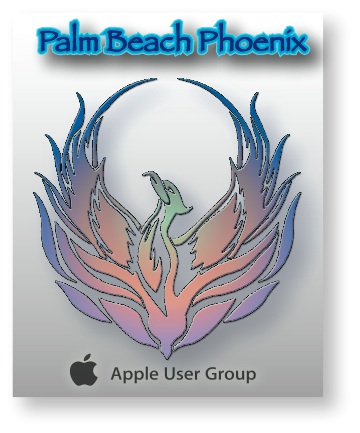Mac Corner: Alternatives to Microsoft Office for Macintosh Business Users
By Larry Grinnell, Palm Beach Phoenix Apple Users Group
 Microsoft Office is the 800-pound gorilla of business applications. It’s virtually impossible to do business without it, and woe be unto those who try to share files created with something other than a Microsoft Office application.
Microsoft Office is the 800-pound gorilla of business applications. It’s virtually impossible to do business without it, and woe be unto those who try to share files created with something other than a Microsoft Office application.
Microsoft Office is a family of software products, consisting of a word processor: Word, a spreadsheet program: Excel, a presentation program: PowerPoint, and several other products, depending upon which version of Office you might purchase. This is the case for Office 2007 on Microsoft Windows.
Microsoft Office for the Macintosh 2008 is a little different. It includes the expected Word, Excel, and PowerPoint products, and a Macintosh-specific email program, Entourage, which is similar to, but not identical to Outlook (the Office email program for the Windows operating system). Office for the Macintosh does not offer web authoring, database, business graphics, or desktop publishing products, but there are so many excellent programs available in those categories, their absence in the Mac Office product is hardly missed.
File formats in Office 2008 are identical to the ones used in Office 2007, so you can share files without changing anything. Just save and send. It gets a little more complicated if you are sharing files with users of Office 2003 (Windows) or Office 2004 (Macintosh).
Why? A couple of years ago, Microsoft updated their product lines with a new default file format for Office products. The benefits of this change are still years away. In the meantime, it has resulted in much user confusion. For the first time, users need to know what version of Office is being used by others, and users not prepared to upgrade to a newer version need to find and learn how to convert these documents so they can read them.
Microsoft Office, whether Windows or Macintosh, isn’t exactly cheap, either. Expect to pay upwards of $250 for a basic version ($400 for Mac users) and as much as $680, upgrades start at about $240. There’s a cheaper home and student version, starting at around $150, but don’t be caught running those in your office if Microsoft comes to visit your place of business. That product is strictly licensed for, well, home and student use.
If you need to share files with others, but can’t really afford the constant upgrade and training cycle of Office, check out open source software. Teams of dedicated software developers collaborate and create software that they simply give away. One such product is OpenOffice.org, which is sponsored by Sun Microsystems, and is a really decent Office substitute that has at least 80 percent of Office’s capabilities. It includes word processor, spreadsheet, presentation, drawing, and database programs. It supports all current Microsoft Office formats, as well as emerging new standards.
What it doesn’t have, though, is an email client. This could be a deal-breaker if you are closely married to a Microsoft Exchange server. You can buy Outlook 2007 separately (but cannot buy Entourage 2008 separately), if this is an issue. If you don’t require that level of messaging sophistication, though, OpenOffice.org might be a viable alternative for your business.
Note that there is no direct support for OpenOffice.org, other than from their website. There is no telephone support. If this is an issue, Sun Microsystems has a supported product identical to OpenOffice.org called StarOffice. Support is not free, nor is StarOffice, which is available for the very reasonable price of $34.95 (volume licensing is available), which includes three telephone support calls.
Additional support options are available at a very reasonable cost, which should give you the peace of mind that a supported Microsoft solution can provide. StarOffice also adds more software, including an open source email client and Personal Information Manager (calendar) to give users a near-Outlook experience. It’s not perfect, and it might not fully integrate with a Microsoft Exchange server, but may be a good solution for smaller offices not tied to an Exchange server for email services.
About Larry Grinnell: Larry has been working with Macintosh and Windows PCs for over 25 years and worked as a senior technical writer and IT support professional for a major midwest-based consumer electronics and telecommunications equipment manufacturer here in South Florida. His musings on a wide variety of topics from computers to jazz guitar to strange foreign cars from the 1950s can be viewed at the MyMac.com website. Click here to reach him by email.
 Writers of this column are members of the Palm Beach Phoenix Apple User Group, a nonprofit organization for Apple Computing Device Users, recognized by Apple Inc., with the purpose of providing educational training and coaching to its members (students, professionals and seniors alike) in a cordial social environment. The club meets the second Saturday of each month from 1 to 4 p.m. at the Fire Station #2, 4301 Dixie Highway in West Palm Beach (just two block south of Southern Boulevard). Click here to visit their website. Click here to reach them by email.
Writers of this column are members of the Palm Beach Phoenix Apple User Group, a nonprofit organization for Apple Computing Device Users, recognized by Apple Inc., with the purpose of providing educational training and coaching to its members (students, professionals and seniors alike) in a cordial social environment. The club meets the second Saturday of each month from 1 to 4 p.m. at the Fire Station #2, 4301 Dixie Highway in West Palm Beach (just two block south of Southern Boulevard). Click here to visit their website. Click here to reach them by email.
